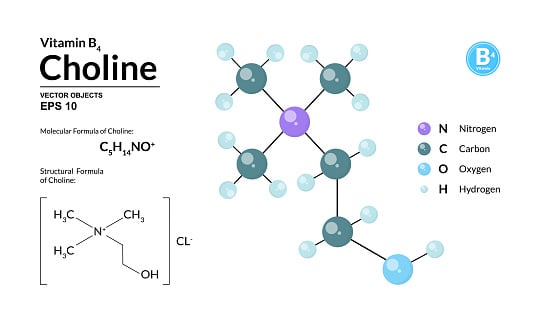Although choline was first discovered in 1862, it took 136 years for researchers and medical professionals to know anything about its functions. In 1998, a study was published by the Institute of Medicine that shared information about the need for choline for good health. In response, the Food and Nutrition Board of the National Academies of Medicine officially recognized it as essential.
However, in 2018, research published in Nutrition Today referred to choline as “The Underconsumed and Underappreciated Essential Nutrient.” In fact, only about 10% of people studied were getting enough from food to supplement the choline that’s naturally produced in our bodies.
Choline is a unique substance. It’s not a vitamin. It’s not a mineral, either. Instead, according to Healthline.com, it’s a water-soluble compound that “impacts liver function, healthy brain development, muscle movement, your nervous system, and metabolism.” It also plays a key role in the brain development of a fetus.
This compound helps to create fats that support our body’s cells and it also serves as a cell messenger. It also helps to remove cholesterol from the liver, synthesize DNA, and much more.
As the National Institute of Health notes, a choline deficiency can cause problems, such as muscle damage and liver damage, including non-alcoholic fatty liver disease. Note that, although a person must have enough choline for healthy liver function and to help prevent non-alcoholic fatty liver disease, more studies must be done.
Studies are also being conducted on choline and heart health, with conflicting results. Some researchers have found that choline may help to protect cardiovascular health, in part by lowering blood pressure. Other studies show that too much of the compound could increase the risk of cardiovascular problems. Still, others haven’t found a significant correlation! So, stay tuned.
Studies are also being conducted to determine the role that choline plays in cognitive function and neurological disorders, including Alzheimer’s disease. More work needs to be done to determine if dietary supplements containing choline may help people with cognitive function disorders, including Alzheimer’s disease.
Dietary Recommendations
USNews.com lists adequate intakes (AI) for choline that were established in 1998. (Note that researchers are trying to determine if the amounts should actually be higher.) Infants, aged 0 to 6 months, require 125mg/day. By the time a female is at least 19 years old, she needs 425/mg daily, while a male of the same age would need 550/mg daily. There are no recommendations that are specific to older adults, with all adults lumped into the same category unless pregnant or breastfeeding, or if genetic conditions indicate a customized recommendation.
Here is a sampling of foods high in choline:
- Beef liver: 355mg in a 3-ounce portion
- Large, hard-boiled egg: 157mg
- Shitake mushrooms: 116mg per cup
- Ground lamb: 79mg in a 3-ounce portion
- Atlantic farmed salmon: 67mg in a 3-ounce portion
- Milk: 40mg per 8 ounces
- Cooked broccoli: 31mg in a half cup
If concerned about your intake, talk to your primary care physician to see if choline supplements can make sense for you. Although these dietary supplements are available over the counter, studies have not yet been done to discover how easily the body can use choline obtained in this way.
The Food and Nutrition Board’s maximum dietary supplement recommendation for adults is 3,500mg but seek medical advice before proceeding. It is possible to take in too much choline, particularly with supplements. Side effects of high doses include low blood pressure, nausea, vomiting, diarrhea, increased sweating and salivation, and fishy body odor. If experiencing these after taking choline, seek medical advice.










